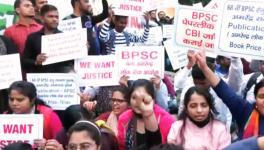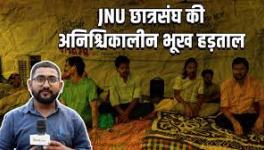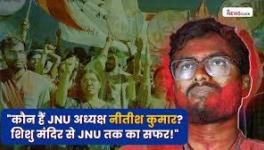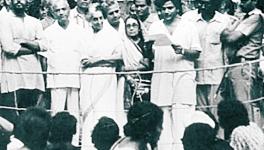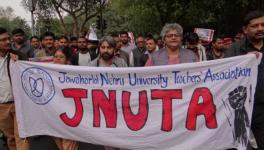A Month After Masked Attack, JNU Still Uneasy and Wary
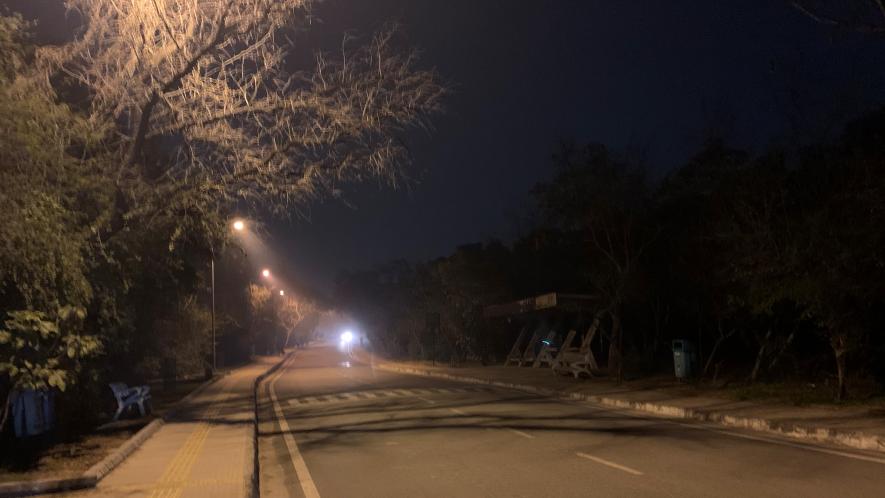
Image Courtesy : Ravi Kaushal
New Delhi: February 5 marks a month after the unprecedented attack by masked persons, some with ABVP links, inside the Jawaharlal Nehru University (JNU) campus which left several students and teachers injured. The police has still not made a single arrest.
However, amidst the high-decibel election campaign in Delhi, fringe extremist groups have time and again called for permanently shutting the down JNU for “sheltering anti-national elements”.
Inside the campus, however, students remain concerned about safety and academics, and are making every effort to reclaim a campus environment known for ferocious yet peaceful debates. NewsClick visited the campus to talk to students to know their feelings, worries and expectations, one month after the attack.
Dripta Sarangi, a first-year student of M.A. Linguistics, hails from West Bengal. Sarangi sustained severe injuries when she and other girl students formed a human chain near the school area to protest the student registration process. “When any protest takes place, girl students always take the lead to deter any attack. It was believed that no one would attack female students. This time, this notion was completely shattered,” she says.
Recalling her journey to the university, Sarangi said she completed her graduation in English from Bethune College in Kolkata. “I wanted to pursue my masters in Linguistics. So, naturally, JNU came up. The Linguistics department here is not only best in India, but also in the world,” she added.
On being asked why she rated the department so highly, Sarangi said the teachers such as Ayesha Kidwai, Pramod Kumar Pandey and others are known personalities in this field in the sub-continent. “Similarly, we were ranked among the top 100 departments for studying linguistics by a prominent journal,” she said.
Sarangi said after the January 5 violence, there was a sense of uneasiness and uncertainty among the students.
“After January 5, the campus is unsafe. Anything can happen now. We have seen how some men wielded their guns and fired shots in Shaheen Bagh and Jamia University. Simultaneously, the Delhi elections are happening and we are also appearing for examinations. So, if anything happens, we have nowhere to go,” she said.
When asked about the impact the violence has had on their personal lives, Sarangi said her family was “concerned”. “The campus saw a police crackdown after the February 9 incident (2016 incident when Kanhaiya Kumar came to the fore) too. But, this time it was too much. Students were dragged and beaten up while police officials remained mute spectators.”
NewsClick met another student who was attacked in Sabarmati Hostel on January 5. The student, who requested anonymity, said the violence had brought unexpected trauma for him and he did not know how to deal with it.
“After seeing the violence, I went to my village. Meanwhile, I also sought psychiatric help. However, I felt it was making me more nervous. So, I abandoned it. I’m healing, but it will take time. They used rods to bang on my door. Even after a month, when somebody bolts a door, I get scared,” he said.
On his academic life, the student said he needed to submit his PhD in July. “Before the violence, I had read and internalised what needs to be written in the thesis. Now, I have forgotten everything. I study up to 10 hours in the library every day but I cannot even write 500 words,” he said.
Critical of the response of and role played by the JNU administration and the police, the student said: “When we needed the administration the most, it backed off. No registrar or rector came to talk to us. It would have instilled confidence in us. Similarly, Delhi Police officials did not bother to talk to us to at least say if that if an emergency happens, these are the numbers to reach out to."
The attack on January 5 was not the first in recent memory when JNU has come under scrutiny. “For this, we need to understand the political geography of Delhi. It is not a centre of any peasant struggle. Neither, is it a power centre for Dalit-Bahujan-Muslim politics. So, it has only one political constituency in the form of students, majority of who have so far been aligned with the Left. So, it naturally becomes a fight between Left and Right. This government wishes to rule with an iron hand where no dissent and critique is allowed. That's why we see consistent attacks on the university. Had any sensible person been tackling the issue, it would not have flared up to this extent. The whole fee hike issue was about only Rs 7 crore. But they made it an 'ego' issue,” he said.
Later in the day, NewsClick met Aishe Ghosh, President, Jawaharlal Nehru University Students' Union (JNUSU). The image of a bloodied Ghosh was all over TV channels the day the violence happened. She, too, acknowledges that a sense of insecurity prevails among the students in the absence of a fair enquiry. “Post-violence, what I am witnessing is increased hostility among the students and student groups,” says Ghosh. She says that while they expected a fair inquiry, it did not happen.
“Instead, the injured persons were booked for violence. Personally, it was mentally exhausting. The fear restricted my movement even though I deliberately try not to... One does not know what will happen. The incident brought fame and people now instantly recognise me. They greet me and often the response is positive. But the way police showed me as one of the culprits, one really does not know how to react. There are many people who think what police is saying is correct. Then, there are people who can go to any extent," she says.
Responding to the question on clarion calls by Right wingers to shut down the University, Ghosh says that it will not happen. “The people running this propaganda know very well that they need an internal enemy to demonise and polarise people. Just look at Shaheen Bagh. They made it an 'internal enemy'. So, JNU would not be closed. Why they attack JNU needs to be understood. JNU is among the very few universities where we have strong students' union. Just look in Delhi, Jamia does not have a students' union, Karnataka has banned students' union elections. When we raised the issue of fee hike, similar demands were raised from other universities. Had they recalled the fee hike, it would have sent a strong message. So, they reduced the fee of other institutions but not JNU. They are using reverse tactics, so that the source of resistance can be curbed."
NewsClick also spoke to Professor Sucharita Sen, who sustained severe injuries in the attack a month ago. She said that the campus is now seen as a site of terror as opposed to earlier when they considered it home.
“The attack was on only one hostel and a few teachers. But the residents of other hostels feel that they too can be attacked. Similarly, the modus operandi of the attack suggests that the students who knew me very well, guided the attackers. Only few colleagues and students know my car and it was smashed badly on the day of attack. So, there is even a lack of trust among the teachers. Despite our differences, the Left and Right could co-exist, could go to a party. That's not happening now, and I think it's antithetical to the teaching and learning process,” she said.
Sen was also not hopeful of positive action from the Delhi Police. “The Crime Branch did not even bother to come to me and know the details. I made my complaint but they did not turn it into an FIR. I have now moved court but have been given a date for two months later,” she added.
When asked if there was any particular reason for the consistent attacks on the university, Sen said she didn’t know for sure but could hazard a guess.
“Things started changing after the present Vice-Chancellor was appointed in January 2016. A month later, the February 9 incident took place. The university has changed immensely. What I can guess is that we remained the top university and were awarded number one. We remain a university where the students from SC, ST (Scheduled Castes and Tribes) and girls from other communities could study. I have never seen any university which has such a diverse representation from across the country. So, why it is getting attacked is a question which must be answered by the ruling party (BJP). "
Get the latest reports & analysis with people's perspective on Protests, movements & deep analytical videos, discussions of the current affairs in your Telegram app. Subscribe to NewsClick's Telegram channel & get Real-Time updates on stories, as they get published on our website.










